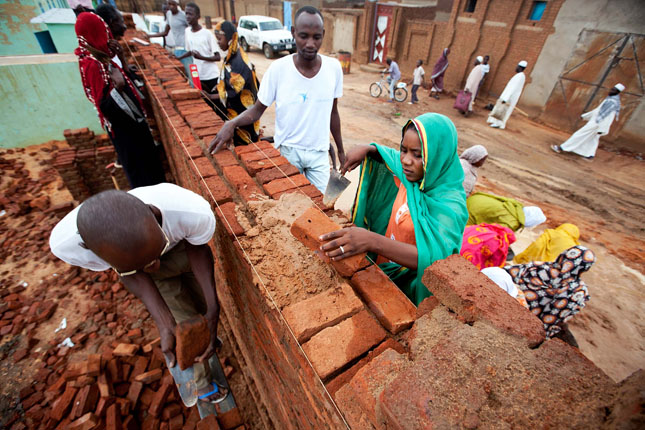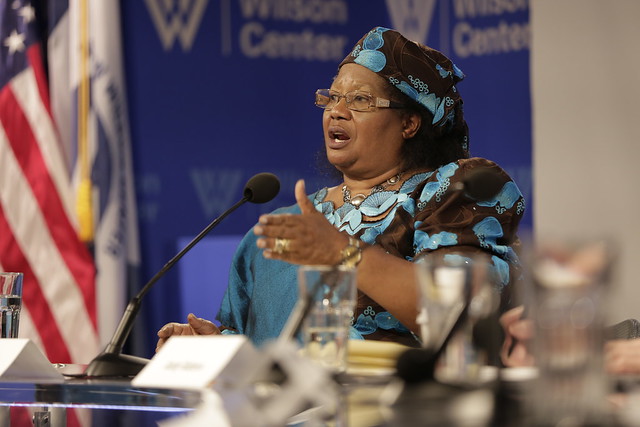-
Resolution 2250 and the Role of Young People in Building Global Peace and Security
October 31, 2016 By Anam Ahmed
Since its adoption in December 2015, United Nations Security Council Resolution 2250 on youth, peace, and security has been hailed as the first of its kind to recognize young people as meaningful drivers of change through its explicit encouragement of youth leadership at all levels of conflict prevention and peacebuilding. “It’s a testament to the fact that global youth today can have a real meaningful impact on the big issues of today, in the big arenas where discussions are happening,” said Andy Rabens, a special advisor on global youth issues for the U.S. Department of State, at the Wilson Center on October 6.
“Many governments saw young people through a lens of fear and insecurity,” Rabens said. “There was a narrative of youth as drivers of conflict and creators of instability as opposed to partners of peace.” The resolution is changing that, but he noted “it’s just ink on paper…How do you turn that ink into action? How do you actually make it come alive?”
The Wilson Center and United Nations Population Fund assembled a panel of experts to discuss how the international community can ensure Resolution 2250 has the intended impact of bringing youth to the fore of peace and security discussions and beyond mere lip service. The resulting conversation highlighted the importance of giving young leaders a seat at the table and providing them with financial and political support to help translate their ideas into action.
Changing the Narrative
Extremist groups often look to raise fresh recruits among young people living in desperate conditions, under exclusionary regimes, or within fractured societies, said Rabens. He pointed to the Islamic State’s knack for glamorizing terrorist life through social media as a prime example.
In 2014, the Islamic State initiated a social media campaign around a new pancake recipe, tweeting photos of “a stack of fluffy pancakes with syrup dripping down” to draw in young men by suggesting it would be their daily breakfast. Rabens called it an “interesting metaphor,” considering the harsh economic conditions in Syria at the time, and said it was important for governments to push back against such campaigns “in a more meaningful, muscular way” by tackling the underlying factors that make them so seductive.
Without the participation of such a large portion of society, peace is harder to achieve“We have to offer a better alternative to pancakes,” he said, urging leaders to seek more creative partnerships to inspire youth-led social movements in the peacebuilding arena under the banner of Resolution 2250. “We need to do more to raise the voices and shine the spotlights on young people who are really advocating in this space.”
Such recruitment and the idea of very youthful demographics being dangerous has led the international community to cast young people as either violent perpetrators or vulnerable victims – or to speak of them only in terms of their potential to become one or the other. But youth participation in conflict prevention and peacebuilding is “the root to achieving sustainable peace,” said Dr. Natalia Kanem, assistant secretary-general and deputy executive director of the United Nations Population Fund. Rabens also criticized these narrow categorizations, saying they are in large part why young people have been excluded from key policy spaces in the past.
The fact is, youth represent a disproportionate percentage of society in many of the most fragile places in the world. The median age in Syria is 21 years old; in Afghanistan it is 18. Without the participation of such a large portion of the population, peace is much harder to achieve.
Leaders of Today
“Youth are the leaders of today, and they are ready today,” said Joyce Banda, the former president of Malawi and a distinguished fellow at the Wilson Center. She urged the international community to redefine their conceptions of leadership and embrace youth-led movements, especially since many young people are already engaged in peacebuilding work not acknowledged by their governments.
Banda pointed out that leadership had already been “transformed” by young people in Africa, home to some of the most youthful populations in the world, and she urged politicians to start not just listening to them but actively involving them. Many of Africa’s longest public officeholders rose to power at a young age themselves during independence movements, and to hold back another generation today is hypocrisy, she said. “You will be surprised what a loss it is for us leaders to stick to power with our fellow 62-year-olds and leave out the youth who can bring up bright, brilliant, young ideas.”
“Youth are not a monolith”Rabens said that when he takes a step back he often finds that he is being mentored by his mentees “in very real ways.” He noted the extensive networks young people have within their communities and the fluency with which they use social media to disseminate their messages are unique assets. They can teach us how to “actually reach people in corners that the governments don’t often always have tentacles in,” he said.
But Dr. Alaa Murabit cautioned against merely allocating “youth” seats at the table. “Youth are not a monolith; in fact, youth are exceptionally fluid,” she said. Before her current role as high-level commissioner of health employment and economic growth at the United Nations, Murabit founded The Voice of Libyan Women at the age of 21 after the fall of Muammar Gaddafi.
Even as the international community looked for civil society groups, and especially women’s groups, to funnel aid to, The Voice of Libyan Women initially had difficulty raising money, Murabit said. “We were not considered women, we were ‘young.’” They were looked over for significant gender-related resources, despite their core focus on female political participation and economic empowerment, because they were seen as just another youth group, she said.
The organization’s experience is reflective of the international system’s inability to handle nuance. “When we talk now about youth, peace, and security, everyone talks about young men who they are worried will pick up guns,” said Murabit, “and when we talk about women’s rights, everyone talks about older women who have influence, networks.” As a result, “young women tend to get left out.”
At the Table for the Right Reasons
To ensure youth participation truly becomes a global priority, more multilateral inter-agency collaboration on advocacy and capacity building is needed for Resolution 2250, said Benoit Kalasa, director of the United Nations Population Fund’s Technical Division. “Young people are not the future; they are making the future, they are shaping the future,” he said, emphasizing the immediacy of the challenge.
Murabit noted that 2250 “comes with a built-in credibility problem, like most UN resolutions.” Theoretically it should be applicable to every country, including developed nations, rather than simply the ones the international community sees as most at risk for conflict. But in reality, such standards are often applied selectively. “This cannot be something sensationalized and imperialized, saying that a certain group of people are only effective and important when they are working with us on certain issues like countering violent extremism,” she said.
“This cannot be something sensationalized and imperialized”Integrating young leaders into not just peacebuilding, but broader policymaking in general will require decision-makers to give up “a huge chunk of our own power,” Murabit said, and the political inertia against power sharing in some places will be a challenge to the resolution’s success.
Kanem offered a more optimistic view on the potential for success, saying Resolution 2250 “at least gives us a platform to demand that this be more systematically embedded in global agendas, in resolutions, and agreements.” She expressed confidence and hope about the progress that could be achieved now that member states had taken this first step.
“A lot of pieces of paper come out of the UN that mean absolutely nothing to people on the ground,” Murabit said. Resolution 2250 “opens up doors” but following through requires transparency and political and financial support, and youth involvement has to be diverse and inclusive, she said. The resolution “has to translate in a way in which it does not rob people of their local dignity – it has them at the table for their experiences and the value they bring, not because we’re worried they might pick up a gun.”
Event Resources:
Sources: The Voice of Libyan Women, United Nations.
Photo Credit: Young people take part in a United Nations Mission in Darfur project to construct a community center in El Fasher, North Darfur, August 2012, courtesy of Albert González Farran/UNAMID.
Topics: Africa, conflict, cooperation, demography, development, featured, From the Wilson Center, gender, Libya, Malawi, Middle East, population, security, UN, UNFPA, video, youth
 A Publication of the Stimson Center.
A Publication of the Stimson Center.




